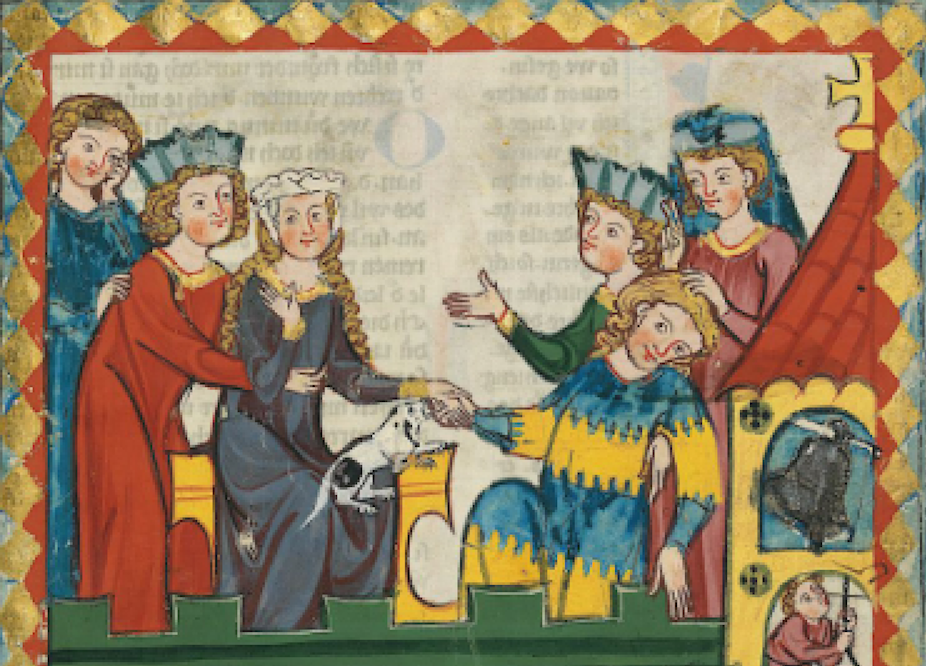In around 1340 Richard Rolle, a 14th-century Yorkshire hermit and mystic, wrote the Fire of Love, part autobiography but largely a guide to achieving mystical union with God.
In chapter 12, he acknowledges that in his early life as a hermit he had been rebuked by various women for paying them too much attention: in one case policing her clothing, in others for making sexualised comments about their bodies, and trying to touch them. In one case he “perhaps already had done so”. It all sounds remarkably like admissions of guilt – but very equivocal admissions at that: perhaps he’s already touched one or another of them.
American scholar Megan Cook of Colby College in Maine posted the passage to Twitter recently, suggesting that sexual harassment and inappropriate behaviour towards women socially and in the workplace are long established – but that if a 14th-century hermit could apologise, so can contemporary perpetrators.
Is this then an early 14th century #MeToo moment, with strongminded Yorkshire women calling out the over-entitled young hermit?
Our first question is whether we can even trust that the events Rolle describes actually happened. About the same time as Rolle was writing, a London manuscript, the Smithfield Decretals, was extensively illustrated with lively scenes from life and fable. There is a series devoted to the story of the Bad Hermit who, living alone, is tempted by the devil – he goes to the tavern, gets drunk, has sex with the miller’s wife, is confronted by the miller whom he beats to death, goes mad, flees to the wilderness and is eventually healed by confession and recovered by a monk.
The parallels with Rolle’s account are striking. Rolle probably had not seen the Smithfield manuscript, but he was drawing on a well-known topos or what we might call narrative arc. Rolle was looking back some 15 or 20 years to his early conversion to the hermit’s life, and part of the purpose of his text was to show his journey from youthful sinner to now accomplished mystic.
Without sin and penance there could be no redemption. Nevertheless, the specifics of Rolle’s misbehaviour, clumsy conflations of moral and spiritual guidance and sexual interest, are so much of a piece with his later career that they are likely to be very personal. But they also raise questions about youthful clerical masculinity more generally.
Original sin
Rolle had been a student at Oxford before he abandoned academia for the hermit’s life. Students were mostly planning on a career as monk or secular priest but they were generally too young (in their teens) to have taken vows of celibacy. So a life that involved sexual contact with women, or perhaps more commonly an ambivalent attitude that both permitted but also disapproved of such contact, was a common part of their experience.
Rolle recognised that he had done wrong and that he needed to re-orientate his life from worldly pleasures to the love of God. The women acted as useful reminders to him – but he clearly felt his wrong was less towards them than towards God. It is notable that, on the second page of chapter 12, Rolle describes a fourth woman, who “despised” him saying that he had “a beautiful face and a lovely voice” but “had done nothing”. The woman’s words are a call to masculine action in embarking upon the penitential and purgative path towards God.
Improper intentions
Rolle was a man who owed a lot to the women in his life. At the beginning of his new religious life his sister gave him two of her gowns so that he could fashion a hermit’s robe and mantle, in contrast to the presumably shorter and more fashionable student gear he had been wearing (the outfit he produced is remarkably like that worn by the Bad Hermit).

Anchoress (a female religious recluse), Margaret Kirkby, to whom he acted as a spiritual director in his later years, promoted his cult as a saint at the nunnery of Hampole near Doncaster and numbers of his texts are addressed to women.
Rolle appreciated the value of friendship between men and women, and thought it rewarding, provided it was not distracted by “improper” intentions, but though “God does not want women to be despised by men” he also thought that women needed direction from men (particularly men like him).
Those unnamed 14th-century Yorkshire women knew what they were talking about, but Rolle was only half listening – and his response was about him, not them. It is to be hoped that their 21st-century granddaughters find the men of our own day able to do a better job. Jury’s out so far.

